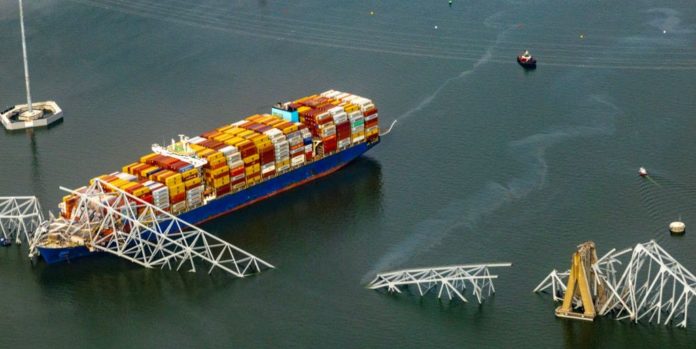- Numerous automakers are facing shipping challenges after Baltimore’s Francis Scott Key Bridge collapsed earlier this week.
- Traffic has been suspended at the Port of Baltimore until further notice, creating issues for many automakers who import vehicles through this large and busy port.
- According to Automotive News, Audi, Bentley, Ford, General Motors, Jaguar Land Rover, Lamborghini, Mazda, Mercedes, Nissan, Subaru, Toyota, and Volvo depend on the port for importing, exporting, and parts shipment.
Numerous automakers are facing shipping challenges on America’s Eastern seaboard following the tragic collapse of the Francis Scott Key Bridge in Baltimore, which left six people missing and presumed dead. The collapse occurred after a 948-foot container ship collided with the bridge, bringing it down almost immediately. On Tuesday, following the collapse, the Port of Baltimore said that vessel traffic in and out of the port would be suspended until further notice, though trucks within the port’s terminals can still be processed.
The port’s closing has created a logistical headache for many automakers who use the area to import vehicles into the United States. Most major automakers use this location to import and export vehicles and parts.
A report from Automotive News notes that Volkswagen and BMW are two examples of automakers that will be less affected because their terminals are located east of the bridge and remain accessible. Others are not so lucky, the paper said, and are being forced to find workarounds until things can return to normal.
“This is a terrible tragedy and our sympathies go out to those injured and still missing in Baltimore,” said John Bozzella, CEO of the Alliance for Automotive Innovation, a firm that represents Ford, GM, Toyota, and Volkswagen, among other major automakers in the U.S. “It’s too early to say what impact this incident will have on the auto business, but there will certainly be a disruption. Baltimore is the No. 1 automobile port in the U.S., and we’re in touch with federal officials to help them understand the scale of automotive operations there.”
Last year, the private and public terminals within the Baltimore port handled 847,158 cars and light trucks. That’s more than any other port inside the United States. “It’s a large port with a lot of flow through it, so it’s going to have an impact,” John Lawler, Ford CFO, said Tuesday on Bloomberg TV. “We’ll work on the workarounds. We’ll have to divert parts to other ports along the East Coast or elsewhere in the country.”
Mercedes-Benz USA CEO Dimitris Psillakis told CNBC that not enough time has passed to glean an accurate picture. “It’s too early to see the effects,” Psillakis said on ‘Money Movers.’ “The situation is still developing, so we’ll do our best to make sure we find ways to supply vehicles to the market. But it is still too early to judge.” He also said the Baltimore port is one of four U.S. distribution centers that the company uses for vehicles coming from Germany.
A spokesperson for General Motors told the Detroit Free Press that the automaker is working with its logistics providers to find shipping options at other ports and that GM does not expect major disruptions to its shipping operations.
Like GM, many of the automakers affected by the suspension in traffic in the Baltimore port say they expect minimal impact. But the extent of the disruptions likely won’t be known for some time yet, as with the supply-chain problems that arose during the COVID-19 pandemic.
Jack Fitzgerald’s love for cars stems from his as yet unshakable addiction to Formula 1.
After a brief stint as a detailer for a local dealership group in college, he knew he needed a more permanent way to drive all the new cars he couldn’t afford and decided to pursue a career in auto writing. By hounding his college professors at the University of Wisconsin-Milwaukee, he was able to travel Wisconsin seeking out stories in the auto world before landing his dream job at Car and Driver. His new goal is to delay the inevitable demise of his 2010 Volkswagen Golf.

